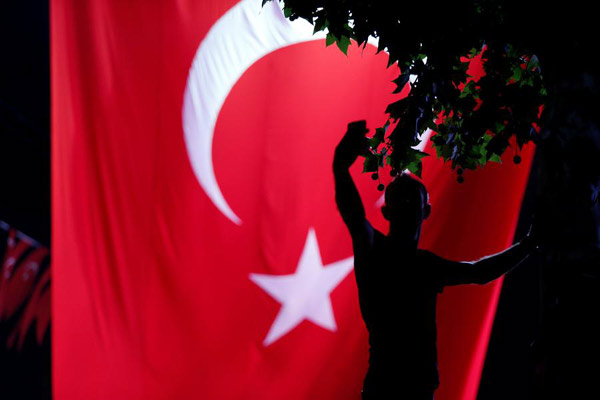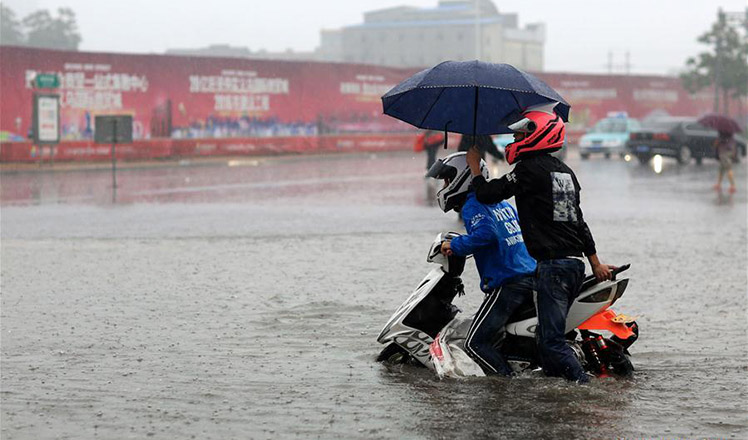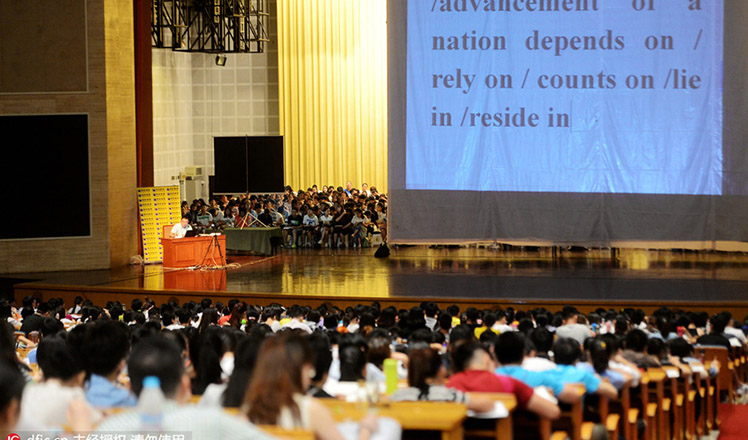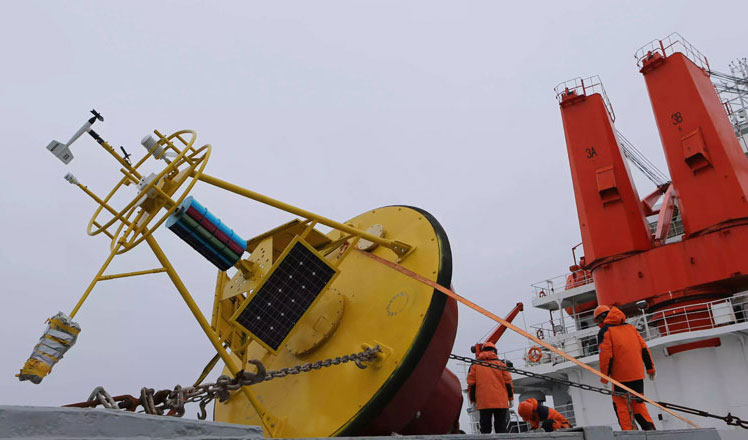Turkey's failed coup to further consolidate Erdogan's power
Updated: 2016-07-20 09:35
(Xinhua)
|
|||||||||
 |
|
A supporter of Turkish President Tayyip Erdogan takes a selfie in front of a giant Turkish national flag during a pro-government demonstration at Taksim square in central Istanbul, Turkey, July 19, 2016. [Photo/Agencies] |
ANKARA - A failed coup in Turkey will further consolidate the power of President Recep Tayyip Erdogan and strengthen his determination for executive presidency, analysts say.
Members of the Gulen movement, a Muslim sect headed by the US-based cleric Fethullah Gulen, who was an ally of President Erdogan before falling out with him in 2013, are accused by the Turkish government of plotting the coup attempt.
Having vanquished the coup attempt, which has cost at least 290 lives, the Turkish government is launching a widespread crackdown with more than 6,000 detained and almost 50,000 civil servants discharged in a bid to strengthen control over all institutions.
Turkey has long been polarized between Erdogan's supporters and his critics over his Islamist and autocratic tendencies, but on the night of July 15, he was able to turn tens of thousands of supporters into the streets, making a call through TV channels against the coup attempt.
Political parties at the parliament declared support for the elected government and denounced the coup attempt. The incident unified many segments of the country which has seen four governments ousted by its military in four decades.
"Eliminating a coup attempt by a faction within the army has become a very important symbol with regards to reinforcing Erdogan's power and political leadership in Turkey," Serkan Demirtas, columnist of local Hurriyet Daily News, told Xinhua.
"Erdogan had challenges throughout his political life, but July 15 coup attempt was the severest," he said.
"Suppressing this attempt made him more powerful, also gave him legitimation for the next political steps in the country," according to Demirtas.
"He initiated to discharge allegedly members of Gulen movement in state institutions, including opponents to him unquestioningly, so that he dissolves dissents," he noted.
Both political figures and media showed a united stance after the incident, Demirtas said, adding that Erdogan has achieved solidarity which was not seen for a long time in the country.
As the ramification of the coup attempt on the Turkish politics, Erdogan moves to a more suitable environment for achieving his ambition to turn the system of Turkey into executive presidency with extended powers, he said.
Nebi Mis, political expert from Foundation for Political, Economical and Social Research (SETA), regarded the coup attempt as a risk posed to the country similar to the Independence War which led to the foundation of Republic of Turkey.
"In the upcoming days, politics in Turkey will focus on cleaning the state from members of the Gulen movement," Mis said.
Since being elected president in 2014, Erdogan has been pushing for a switch to the presidential system for him to emerge as the sole figure calling the shots in the government and in his ruling party.
The current constitution requires a president to be impartial and cut off all his ties with the party he was affiliated with before election.
Erdogan, however, has kept meddling into affairs of the ruling Justice and Development Party, as being one of the founders and leader of the party till 2014.
- 103 senior military officers detained in Turkey's coup attempt probe
- Arrests hit 6,000 as Turkey cracks down on army and judges after coup bid
- Turkey's constitutional reforms may speed up after failed coup
- Turkey's Foreign Ministry says over 290 killed in military coup attempt
- France says question marks over Turkey's role in fight against Islamic State
- Turkey's PM says 161 dead in military coup attempt
- Endangered elephants relocated by crane in Africa
- THAAD news met by DPRK missile launches
- DPRK top leader guides ballistic rocket test-firing
- Turkey's failed coup to further consolidate Erdogan's power
- Boris Johnson says UK not abandoning leading role in Europe
- Armed man attacked passengers on a train in Germany

 Heavy rain, floods across China
Heavy rain, floods across China
 Super-sized class has 3,500 students for postgraduate exam
Super-sized class has 3,500 students for postgraduate exam
 Luoyang university gets cartoon manhole covers
Luoyang university gets cartoon manhole covers
 Top 10 largest consumer goods companies worldwide
Top 10 largest consumer goods companies worldwide
 Taiwan bus fire: Tour turns into sad tragedy
Taiwan bus fire: Tour turns into sad tragedy
 Athletes ready to shine anew in Rio Olympics
Athletes ready to shine anew in Rio Olympics
 Jet ski or water parasailing, which will you choose?
Jet ski or water parasailing, which will you choose?
 Icebreaker Xuelong arrives at North Pacific Ocean
Icebreaker Xuelong arrives at North Pacific Ocean
Most Viewed
Editor's Picks

|

|

|

|

|

|
Today's Top News
Ministry slams US-Korean THAAD deployment
Two police officers shot at protest in Dallas
Abe's blame game reveals his policies failing to get results
Ending wildlife trafficking must be policy priority in Asia
Effects of supply-side reform take time to be seen
Chinese State Councilor Yang Jiechi to meet Kerry
Chinese stocks surge on back of MSCI rumors
Liang avoids jail in shooting death
US Weekly

|

|









